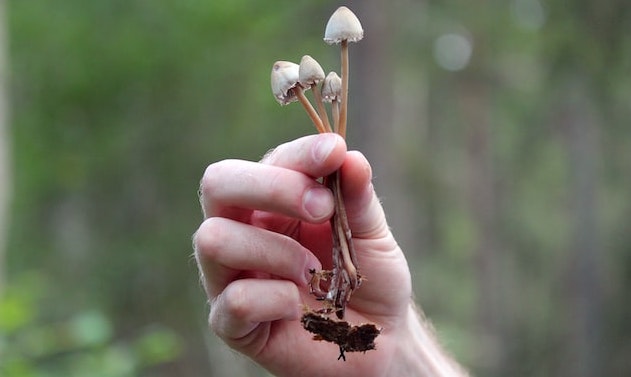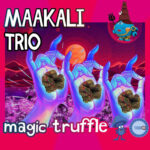Of course it caught many eyes and baited many clicks. With the continuous wave of positive psychedelic research it seemed almost level with other headlines. But this was pretty crazy… some might say too good to be true?
There’s Something In It!
Well, wouldn’t you know — there could actually be something in it. Though it’s very, very, very early days, the researchers who helmed the study the titular ‘woman’ was involved in clearly felt that their findings were more than a coincidence.
So, here’s the story behind the headlines; we have to admit, it’s pretty exciting.
Combining Chemotherapy with Psilocybin and Cannabis
Back in September this year the journal Drug Science, Policy and Law published a paper by a small team of medical researchers hailing from the U.K. and the U.S. They had found that a breast cancer patient may have put the disease into remission by taking cannabis oil and magic mushrooms alongside her course of traditional chemotherapy.

The patient, a 49-year old woman named Nicole DiMonda, had been diagnosed in 2018 with stage IV breast cancer. It had unfortunately metastasized to her lymph nodes, liver and bones. With this bleak prognosis, she was quickly put on a course of chemotherapy. However, she decided, personally, to also begin taking both cannabis oil and psilocybin microdoses. The psilocybin was administered to her by a trained therapist.
The Patient’s Cancer Disappeared
After several months of these treatments, DiMonda was tested again. The doctors were perplexed to find that all of her tumors had disappeared. The chemotherapy was halted, but she continued to take the psilocybin and cannabis oil. Seven months later, tested again, her cancer was still gone. As a result, DiMonda decided to halve her cannabis oil use and stop the psilocybin microdosing altogether.
Almost a year later, in June of 2020, a test showed that her cancer had come back. Due to this she began her chemo-cannabis oil-psilocybin regime once again. By October of 2021 the tumors had “stabilized.”
However, this is where our story ends, as no more details have been provided since then. It is not clear if DiMonda’s condition improved again or worsened.
The Patient’s Experience- In Her Own Words
But, in a recent press release about the study, DiMonda’s perspective at the time of her treatment was shared;
In September 2018, I was diagnosed with stage IV metastatic breast cancer. My first thought was,”what am I going to tell my mother?”
I immediately began incorporating cannabis into my daily treatment plan. By January 2019, I was found to have no evidence of disease according to my scans. This was absolutely unexpected. When one is diagnosed with cancer, the mental, physical and emotional events which consume and slowly chip away at ones humanity become a daily routine.
Everything changes in a heartbeat, and suddenly death becomes your daily counterpart. It’s dehumanizing, demoralizing, and just plain horrific.
Cannabis changes all of this. It will ease the suffering of so many, as it eased mine. Cannabis provides hope. It provides help when you feel you can’t go on. I was able to eat. I was able to sleep. The nausea was almost non-existent. I could function, work. I was no longer slave to my disease.
Imagine a world that embraces cannabis as a true medicinal plant that heals those afflicted with illness. That is the hope cannabis provides. It heals. It restores and gives life. And access should NEVER be in question.”
A Powerful Advocate for Psychedelics
Hearing DiMonda’s own words about her experience work as a powerful advocate for the case of involving psychedelics in cancer treatment. It also adds a poignant human element to what could have become a sensationalist viral story.

One of Nicole’s physicians Dr. Dustin Sulack had this to say;
“Working clinically with patients with cancer, interventions like cannabis and psilocybin-containing mushrooms that can improve quality of life, relieve symptoms such as pain, depression, and anxiety, reduce the adverse effects of conventional treatments, and promote psychological adaptation to a challenging diagnosis and prognosis are invaluable, and witnessing their impact on patients is profound. The potential that these same interventions may also enhance our innate anti-cancer mechanisms and work additively or synergistically with conventional treatments is truly exciting.”
The Growing Relationship of Psychedelics and Cancer Treatment
This is not the first time that cancer and psychedelics have been found to complement each other. However, previous to Nicole DiMonda’s experience research had mainly focused on using psychedelics to treat the emotional toll of the disease. There have been many studies and some advancements in this area, such as when psilocybin treatment was granted to Canadian cancer patients back in 2021. Also in 2021, an open-label study which analyzed the impact of psilocybin on cancer patients conducted at the Maryland Oncology Hematology department at the Aquilino Cancer Center found that 50% of the patients reported that their depression to be in remission within a week of taking COMP360’s psilocybin medication. This result sustained for up to 8 weeks during follow-up meetings.
New Research Brings Exciting Results
Additionally, in March this year Cannabotech, a biotech company, developed a supplement called CannaboBreast containing the compounds of psilocybin and cannabis. This was studied in cell models. They found that it was able to reduce the amount of chemotherapy treatments needed, as well as being 6 times more effective at killing cancer cells when used with chemotherapy. It is currently being tested on different subtypes of breast cancer, with an adapted treatment for each one. This research lends further gravitas to the findings of the study of which Nicole DiMonda was part.

It’s Early Days, But Results Are Promising
As we said, it is still very early days, but the findings are very promising indeed. As Dr. Sulak explains;
“Working clinically with patients with cancer, interventions like cannabis and psilocybin-containing mushrooms that can improve quality of life, relieve symptoms such as pain, depression, and anxiety, reduce the adverse effects of conventional treatments, and promote psychological adaptation to a challenging diagnosis and prognosis are invaluable, and witnessing their impact on patients is profound.
The potential that these same interventions may also enhance our innate anti-cancer mechanisms and work additively or synergistically with conventional treatments is truly exciting.”





